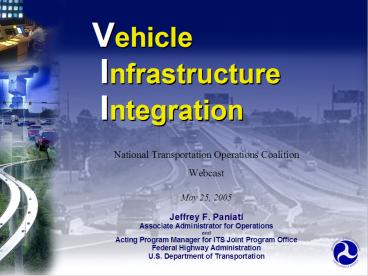Vehicle Infrastructure Integration - PowerPoint PPT Presentation
1 / 20
Title:
Vehicle Infrastructure Integration
Description:
Acting Program Manager for ITS Joint Program Office ... BMW. Daimler Chrysler. Ford. GM. Nissan. Toyota. VW. FHWA. NHTSA. Vehicle. Infrastructure. Integration ... – PowerPoint PPT presentation
Number of Views:1288
Avg rating:3.0/5.0
Title: Vehicle Infrastructure Integration
1
Vehicle Infrastructure Integration
National Transportation Operations Coalition
Webcast
May 25, 2005
- Jeffrey F. Paniati
- Associate Administrator for Operations
- and
- Acting Program Manager for ITS Joint Program
Office - Federal Highway Administration
- U.S. Department of Transportation
2
Presentation Outline
- What is VII?
- Why Deploy VII?
- Who is Involved?
- Whats Happening?
3
Vehicle Infrastructure Integration
Vehicle Infrastructure Integration
- Connecting Vehicles and Infrastructure
Creating an enabling communication
infrastructure
4
Basic Premise
- All new vehicles would be equipped with a
short-range data communications capability (DSRC
_at_ 5.9GHz) and a positioning capability (GPS). - A nationwide roadway-based data communications
network would be created.
5
VII Can Enable a Wide Range of Safety Mobility
Applications
Vehicle Infrastructure Integration
Traffic Management
Traveler Information
Weather Sensing
Intersection Collision Avoidance
for example
6
How We Got Here
- The Confluence of Three Activities Have Presented
an Opportunity - Advancements under the ITS Vehicle Safety
Program. - Growing Emphasis on Roadway System Management and
Operations. - Evolution of Communications Technology.
7
Driving Forces Safety
Vehicle Infrastructure Integration
We have the opportunity to change the trend.
VII Deployment
1990
2000
1980
8
Meeting the Safety Challenge
- While crashworthiness standards have been and
will continue to be very important, we are
reaching the point of diminishing returns by
focusing only on crashworthiness. The biggest
return on investment in terms of lives saved and
injuries prevented in the future will come from
accelerated development and deployment of crash
avoidance technologies. - Jeffrey W. Runge M.D.,
Administrator NHTSA
9
Auto Industry/U.S. DOTCooperative Research
- Vehicle/infrastructure cooperation is a critical
element for preventing - Intersection collisions
- Road departure collisions
These two factors account for 50 of the
crashes and fatalities on our roads
10
Driving Forces Mobility
V I I D e p l o y m e n t
46hrs/yr
82
1990
2000
1980
2
11
Improving Reliability Through System Management
and Operations
Sources of Traffic Congestion
System-wide Real-time Information is the Key!
12
Traffic Management
- Traffic Management Centers widely deployed in the
United States, but surveillance capability is
limited. - Ability to improve operations of the highway
network could be significantly improved with
system-wide availability of real-time
information. - Vehicles could provide
- Average speeds
- Travel times
- Weather conditions
- Incidents
- Applications include
- Traffic signal timing
- Ramp metering
- Emergency response
- Evacuation
- Weather management
- Transit coordination
13
Traveler Information
- Current traveler information systems are
dependent on limited data. - Probe vehicles could provide complete network
information. - Tailored information could be
- provided directly to motorists
- en-route alerts
- (weather, incidents,
- emergencies)
- congestion maps
- dynamic routing
14
And Much More . . .
- Safety
- Intersection Collision Avoidance -- Rail
Crossing Warning - Roadway Departure Warning -- Emergency
Vehicle - Emergency Brake Lights Preemption
- Cooperative Forward Collision Warning
- Mobility
- In Vehicle Signage -- Winter
Maintenance - Traffic Signal Control
-- Traveler Information - Weather alert
- Consumer Commercial
- Electronic Tolls
- Drive thru Payment
- Remote Diagnostics
- Customer Relations Management
15
VII Coalition
Vehicle Infrastructure Integration
- USDOT
- FHWA FMCSA
- NHTSA FTA
- AASHTO
- 10 State DOTs
- Auto Companies
- BMW
- Daimler Chrysler
- Ford
- GM
- Nissan
- Toyota
- VW
FHWA
NHTSA
16
Focus of the Coalition
- Is the investment necessary to equip new vehicles
and the roadway infrastructure with
communications warranted? - Can the investment by the public sector and auto
industry be coordinated?
17
6 Concurrent Program Tracks
- Track 1 Technical Implementation
- Track 2 DSRC Prototype
- Track 3 Business Models
- Track 4 Institutional Issues
- Track 5 Outreach
- Track 6 Test Program
Duration of Initiative FY 04 - FY 08
VII Public Meeting
Architecture
DSRC Prototype
Proof of Concept Engineering Test
Working Group Activity
FOT
06
07
08
04
05
Privacy Principles
18
Progress to Date
- Industry Partnership Created
- Technical Feasibility Established
- Initial Requirements/Architecture Defined
- DSRC 802.11p Standards Nearly Complete
- DSRC Industry Consortium Building Prototype
- Key Institutional/Deployment Issues Identified
- National Public Meeting Held
19
Next Steps
- Address Key Issues
- Demonstrate and document benefits
- Business model
- Privacy
- Liability
- Expand Coalition
- Toll authorities
- Local government
- Other industry partners
20
Imagine the Possibilities
- Connecting Vehicles and
Infrastructure
Creating an enabling communication
infrastructure
via a Coordinated Investment

